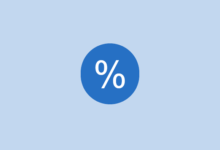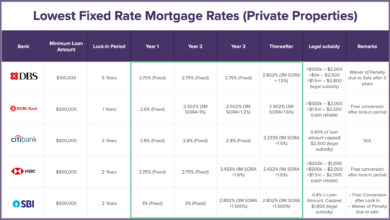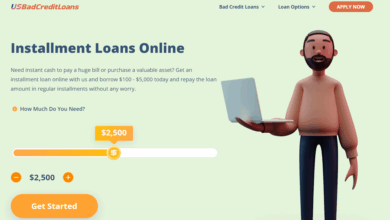Emergency Loans For Bad Credit: Accessing Financial Help When You Need It Most
Emergency loans for bad credit offer a lifeline in times of financial need, providing crucial support to individuals facing credit challenges. As we delve into the intricacies of this topic, we uncover valuable insights that can guide you towards making informed decisions.
This guide is designed to equip you with essential knowledge on emergency loans for bad credit, empowering you to navigate the borrowing landscape with confidence and clarity.
Overview of Emergency Loans for Bad Credit
Emergency loans are financial products designed to provide quick access to funds in times of urgent need. Unlike regular loans that may have a lengthy approval process, emergency loans are typically approved faster to address immediate financial needs. Bad credit refers to a low credit score resulting from a history of missed payments, high debt levels, or other factors that make borrowing difficult. Emergency loans for bad credit are crucial for individuals who may not qualify for traditional loans due to their credit history, providing them with a lifeline during emergencies.
Guidelines for Applying for Emergency Loans with Bad Credit
When considering emergency loans for bad credit, it is essential to research and compare various options to find the best fit for your financial situation. Look for reputable lenders who specialize in bad credit loans and compare interest rates, fees, and repayment terms. Additionally, taking steps to improve your credit score before applying, such as paying down existing debts or correcting any errors on your credit report, can increase your chances of approval. Understanding the terms and conditions of emergency loans is crucial to avoid any surprises and ensure you can repay the loan responsibly.
Managing Emergency Loan Repayments with Bad Credit
Creating a budget to allocate funds for loan repayments is essential to ensure you can meet your financial obligations on time. By prioritizing loan payments and cutting back on non-essential expenses, you can stay on track with repayments and avoid defaulting on your loan. Defaulting on emergency loan payments with bad credit can further damage your credit score and make it harder to access credit in the future. Utilize resources or tools such as budgeting apps or financial spreadsheets to track your repayments and manage your finances effectively.
Types of Emergency Loans Available for Bad Credit
Emergency loans for bad credit come in various forms to cater to individuals in need of quick financial assistance. Let’s explore the different types of emergency loans available for those with bad credit.
Payday Loans
Payday loans are short-term loans typically due on the borrower’s next payday. These loans are known for their high interest rates and fees, making them a costly borrowing option for many. Eligibility for payday loans usually requires proof of income, a valid ID, and an active bank account. Some reputable lenders offering payday loans include Speedy Cash and Check Into Cash.
Installment Loans
Installment loans allow borrowers to repay the loan amount over a set period in regular installments. These loans usually have lower interest rates compared to payday loans but may still come with high fees. Eligibility criteria for installment loans often include a credit check, proof of income, and a valid ID. Lenders like OppLoans and LendUp offer installment loans to individuals with bad credit.
Personal Loans
Personal loans are unsecured loans that can be used for various purposes, including emergencies. These loans typically have lower interest rates compared to payday and installment loans but may require a higher credit score for approval. Eligibility for personal loans may include a credit check, proof of income, and a good credit history. Some reputable lenders offering personal loans to individuals with bad credit are Avant and OneMain Financial.
| Loan Type | Interest Rate | Repayment Terms | Maximum Loan Amount |
|---|---|---|---|
| Payday Loans | Up to 400% | Due on next payday | $500 – $1,000 |
| Installment Loans | Varies | Fixed monthly installments | $1,000 – $10,000 |
| Personal Loans | 6% – 36% | 1 to 5 years | $1,000 – $50,000 |
Application Process
The application process for each type of emergency loan may vary, but typically requires proof of income, identification documents, and bank account information. Approval times can range from a few minutes for payday loans to a few days for installment and personal loans. It’s important to compare multiple lenders and carefully review the terms and conditions before committing to any loan.
Pros and Cons of Emergency Loans for Bad Credit
Emergency loans for bad credit can be a saving grace in times of financial crisis, but they also come with their own set of advantages and disadvantages.
Advantages of Emergency Loans for Bad Credit
- Quick access to funds during emergencies
- Opportunity to improve credit score with timely repayments
- No collateral required for most emergency loan options
Drawbacks and Risks of Emergency Loans for Bad Credit
- Higher interest rates compared to traditional loans
- Potential for debt trap if not managed properly
- Risk of further damaging credit score with default on payments
Examples of Situations where Emergency Loans can be Beneficial or Detrimental
- Beneficial: Covering unexpected medical expenses
- Detrimental: Using the loan for non-essential purchases
- Beneficial: Repairing essential home appliances
- Detrimental: Taking out loans for luxury vacations
How to Apply for Emergency Loans with Bad Credit
When applying for emergency loans with bad credit, it is important to follow a specific process to increase your chances of approval. Here is a step-by-step guide on how to apply for emergency loans with bad credit:
Documentation Required and Information Needed
- Proof of income: Lenders will require documentation such as pay stubs, bank statements, or tax returns to verify your income.
- Identification: You will need to provide a valid ID such as a driver’s license or passport.
- Credit history: While bad credit is accepted, some lenders may still want to review your credit history.
- Proof of residency: Lenders may ask for utility bills or lease agreements to verify your address.
- Employment information: You may need to provide details about your employer, including contact information.
Tips to Increase Approval Chances
- Improve your credit score: While emergency loans for bad credit are available, a higher credit score can increase your chances of approval.
- Add a co-signer: Having someone with a good credit history co-sign your loan can improve your chances of approval.
- Shop around: Compare offers from different lenders to find the best terms and rates for your situation.
- Be honest: Provide accurate information on your application to avoid any delays or rejections.
- Show stability: Lenders may look for stable employment and residency history to assess your ability to repay the loan.
Interest Rates and Fees Associated with Emergency Loans for Bad Credit
When considering emergency loans for bad credit, it’s crucial to understand the interest rates and fees that come with them. These additional costs can significantly impact the total amount you’ll need to repay, making it essential to compare options carefully.
Common Interest Rates and Fees
- Interest Rates: Emergency loans for bad credit typically come with higher interest rates compared to traditional loans. These rates can range from 15% to 36% or even higher, depending on the lender and the borrower’s creditworthiness.
- Origination Fees: Some lenders may charge origination fees, which are upfront fees for processing the loan. These fees can range from 1% to 8% of the total loan amount.
- Late Payment Fees: Missing a payment on your emergency loan can result in late payment fees, adding to the overall cost of the loan. These fees can vary by lender but are typically around $25 to $50.
Varying Interest Rates Based on Loan Type and Lender
- Secured vs. Unsecured Loans: Secured emergency loans, where you provide collateral, may come with lower interest rates compared to unsecured loans. However, there’s a risk of losing your collateral if you default on the loan.
- Personal Loans vs. Payday Loans: Personal loans generally have lower interest rates than payday loans, which often come with extremely high APRs. It’s essential to explore all available options and choose the one with the most favorable terms.
Strategies for Finding Affordable Options
- Shop Around: Compare offers from different lenders to find the most competitive rates and fees. Online loan comparison tools can help simplify this process.
- Improve Your Credit Score: Taking steps to improve your credit score can potentially qualify you for better loan terms in the future. This may include paying off debts, making timely payments, and disputing any errors on your credit report.
- Consider Alternative Lenders: Some credit unions, community banks, and online lenders offer more flexible terms for borrowers with bad credit. Exploring these options could lead to more affordable loan choices.
Alternatives to Emergency Loans for Individuals with Bad Credit
When facing financial emergencies with bad credit, there are alternative options to consider aside from emergency loans. These alternatives may offer different terms, requirements, and advantages for individuals in need of assistance.
Credit Unions
Credit unions are member-owned financial cooperatives that may provide loans to individuals with bad credit. They often have more flexible terms and lower interest rates compared to traditional banks.
Friends and Family Loans
Borrowing money from friends or family members can be a quick solution for emergencies. However, it’s crucial to establish clear repayment terms to avoid straining relationships. Additionally, this option may not be feasible for everyone.
Nonprofit Organizations
Nonprofit organizations and charities may offer financial assistance to individuals in need. These organizations may provide grants, low-interest loans, or other forms of support for specific emergencies. It’s essential to research and find reputable organizations in your area.
Impact of Emergency Loans on Credit Score
Taking out emergency loans can have a significant impact on the credit score of individuals with bad credit. It is essential to understand how these loans can affect your creditworthiness and take steps to minimize any negative repercussions.
Managing Emergency Loans to Minimize Negative Effects
- Make timely payments: Ensure you make all payments on time to avoid damaging your credit score further.
- Monitor your credit report: Regularly check your credit report for any errors or discrepancies that could affect your score.
- Limit new credit applications: Avoid applying for multiple new credit accounts, as this can negatively impact your credit score.
Using Emergency Loans Responsibly to Improve Credit Score
- Borrow only what you need: Avoid taking out more than you require to minimize the debt burden.
- Create a repayment plan: Develop a strategy to repay the loan on time and in full to demonstrate responsible borrowing behavior.
- Diversify credit mix: Consider different types of credit to show lenders that you can manage various financial obligations.
Credit Score Impact of Timely Repayment vs. Defaulting
- Timely repayment: Making timely payments can help boost your credit score over time and improve your creditworthiness.
- Defaulting: Defaulting on emergency loans can severely damage your credit score and make it challenging to access credit in the future.
Secured vs. Unsecured Emergency Loans
- Secured loans: Defaulting on a secured loan can result in the loss of collateral, while timely repayments can positively impact your credit score.
- Unsecured loans: These loans typically have higher interest rates, and defaulting can lead to a significant decrease in credit score.
Credit Utilization Ratio and Emergency Loans
- Credit utilization: Using a substantial portion of your available credit can negatively impact your credit score. Emergency loans add to your overall debt, affecting this ratio.
Credit Inquiries and Credit Scores
- Impact of inquiries: Multiple credit inquiries can lower your credit score temporarily, so it’s essential to limit applications for new credit.
Actions to Repair Credit Score After Emergency Loans
- Pay down existing debt: Reduce your overall debt burden to improve your credit score.
- Dispute inaccuracies: If you find errors on your credit report, take steps to dispute and correct them to boost your score.
- Seek credit counseling: Consider professional help to manage your finances better and improve your credit score.
Regulations and Legal Aspects of Emergency Loans for Bad Credit
Emergency loans for bad credit are subject to specific regulations and laws to protect consumers from predatory lending practices. These regulations ensure that lenders follow certain guidelines when offering emergency loans to individuals with poor credit histories.
Consumer Protections and Verification of Legitimacy
- Consumer protections: Regulations such as the Truth in Lending Act and the Fair Debt Collection Practices Act provide safeguards for borrowers against unfair lending practices.
- Verification of legitimacy: Borrowers can verify the legitimacy of lenders offering emergency loans for bad credit by checking if the lender is licensed in their state and reviewing customer feedback and reviews.
Comparison of Interest Rates and Terms
- Traditional financial institutions: Banks and credit unions may offer lower interest rates and more favorable terms for emergency loans compared to online lenders.
- Online lenders: While online lenders may provide faster approval processes, they often come with higher interest rates and fees for emergency loans for bad credit.
Consequences of Defaulting and Legal Actions
- Defaulting on an emergency loan for bad credit can result in damage to the borrower’s credit score and potential legal actions by the lender, such as wage garnishment or asset seizure.
Step-by-Step Guide for Applying for Emergency Loans
- Check eligibility criteria: Review the minimum requirements for credit score, income, and other factors set by the lender.
- Gather required documents: Prepare documents such as proof of income, identification, and bank statements to support your loan application.
- Research lenders: Compare interest rates, fees, and customer reviews of different lenders offering emergency loans for bad credit.
- Submit application: Complete the online application form or visit a local branch to apply for an emergency loan.
- Wait for approval: Once you submit your application, wait for the lender to review and approve your loan request.
Case Studies: Real-life Examples of Emergency Loans for Bad Credit
In this section, we will delve into detailed case studies of individuals who successfully obtained emergency loans despite having bad credit. These real-life examples will provide insights into the steps taken, challenges faced, and outcomes achieved.
Case Study: John’s Journey to Securing an Emergency Loan
John, a working professional, found himself in a financial crisis due to unexpected medical expenses. With a poor credit score, traditional lenders were reluctant to offer him a loan. However, John explored alternative options such as online lenders and credit unions.
- John researched various online lenders specializing in emergency loans for bad credit borrowers.
- He compared interest rates, repayment terms, and customer reviews to select a reputable lender.
- After submitting an application with the chosen lender, John provided necessary documentation to support his income and employment status.
- Despite initial challenges, John’s loan application was approved, and he received the funds within 24 hours.
Loan Terms and Credit Score Improvement
John’s emergency loan had a higher interest rate compared to traditional loans, but he prioritized timely repayments to avoid further financial strain. By making consistent payments, John not only managed to cover his expenses but also saw a gradual improvement in his credit score over time.
Tips for Managing Emergency Loans with Bad Credit
When dealing with emergency loans for bad credit, it is essential to have a solid plan in place for managing your finances effectively. Here are some practical tips to help you navigate through this challenging situation:
Budgeting Strategies and Financial Management
- Create a detailed budget outlining your monthly income and expenses to understand your financial situation better.
- Identify areas where you can cut costs and reduce unnecessary spending to free up funds for loan repayments.
- Consider working with a financial advisor or credit counselor to establish a realistic repayment plan that fits your budget.
- Explore opportunities to increase your income through part-time work or side gigs to supplement your finances.
Negotiating with Lenders and Seeking Assistance
- Communicate with your lender proactively if you encounter difficulties in making payments, and inquire about alternative repayment options or hardship programs.
- Research and apply for assistance programs or grants designed to help individuals with bad credit facing financial emergencies.
- Consider seeking a co-signer with good credit to improve your chances of securing favorable loan terms or lower interest rates.
Monitoring Loan Payments and Building an Emergency Fund
- Keep track of your loan payments and due dates to avoid missing any deadlines and incurring additional fees or penalties.
- Set up automatic payments or reminders to ensure timely repayment and stay on top of your financial obligations.
- Focus on building an emergency fund for future unexpected expenses to reduce reliance on high-interest loans in times of crisis.
Improving Credit Scores and Long-Term Financial Stability
- Monitor your credit report regularly and address any errors or discrepancies that could negatively impact your credit score.
- Prioritize paying off existing debts and maintaining a positive payment history to gradually improve your creditworthiness over time.
- Seek financial education resources or workshops to enhance your money management skills and make informed decisions about borrowing and spending.
Financial Education and Resources for Borrowers with Bad Credit
Financial literacy is crucial for individuals with bad credit seeking emergency loans. By understanding credit, managing finances, and making informed decisions, borrowers can improve their financial health. Here are some recommendations and tools to help individuals with bad credit navigate emergency loans effectively.
Creating a Budget Tailored to Bad Credit
Creating a budget is essential for individuals with bad credit to manage their finances effectively. Follow these steps to create a budget tailored to your financial situation:
- Calculate your monthly income and expenses.
- Identify areas where you can cut costs.
- Allocate funds for essentials like rent, utilities, and groceries.
- Set aside a portion of your income for savings or emergency funds.
- Track your spending and adjust your budget as needed.
Common Financial Pitfalls to Avoid
Avoiding common financial pitfalls can help individuals with bad credit improve their financial situation. Some pitfalls to watch out for include:
- Missing payments on loans or credit cards.
- Ignoring credit reports and scores.
- Overspending and living beyond your means.
- Falling for predatory lending practices.
- Not seeking help or guidance when needed.
Comparison Table of Emergency Loans for Borrowers with Bad Credit
Here is a comparison table of different types of emergency loans available for borrowers with bad credit:
| Loan Type | Interest Rate | Loan Amount |
|---|---|---|
| Payday Loans | High interest rates | Up to $1,000 |
| Installment Loans | Lower interest rates | Up to $5,000 |
| Personal Line of Credit | Variable interest rates | Up to $10,000 |
Bad credit can significantly impact the interest rates offered on loans, resulting in higher costs for borrowers.
Emergency Loans for Bad Credit During Economic Crises
During economic crises, the need for emergency loans for individuals with bad credit becomes even more critical. As financial instability and job losses increase, many people find themselves in urgent need of funds to cover essential expenses.
Role of Emergency Loans During Economic Downturns
Emergency loans play a crucial role during economic downturns by providing quick access to funds for individuals who may not qualify for traditional loans due to their bad credit history. These loans help bridge the gap during financial emergencies, such as unexpected medical bills, car repairs, or other urgent needs.
Changes in Availability and Terms
During economic crises, the availability and terms of emergency loans may change. Lenders may tighten their criteria or increase interest rates to mitigate the higher risk associated with lending to individuals with bad credit. This can make it more challenging for people to secure emergency funds when they need them the most.
Impact on Demand for Emergency Loans
Economic crises typically lead to a surge in the demand for emergency loans among individuals with bad credit. With job losses and reduced income, many people rely on these loans to cover basic living expenses and avoid falling into further financial hardship. The increased demand can strain the resources of lenders and potentially lead to delays in loan approval.
Future Trends and Innovations in Emergency Loans for Bad Credit
As the financial landscape continues to evolve, several future trends and innovations are expected in the emergency loan industry for individuals with bad credit. These changes aim to provide better access to credit for those in need and improve the overall borrowing experience.
Increased Use of Alternative Data
- Traditional credit scoring models may not always accurately reflect an individual’s creditworthiness, especially for those with bad credit. As a result, lenders are increasingly turning to alternative data sources such as utility bill payments, rental history, and even social media behavior to assess a borrower’s credit risk.
- This shift towards alternative data allows lenders to make more informed lending decisions and provide emergency loans to individuals who may have been overlooked by traditional credit scoring methods.
Integration of Artificial Intelligence
- Artificial intelligence (AI) and machine learning technologies are being utilized to streamline the loan application process and improve underwriting efficiency.
- AI-powered algorithms can analyze vast amounts of data in real-time, enabling lenders to assess credit risk more accurately and offer personalized loan terms to borrowers with bad credit.
Introduction of Microloans and Peer-to-Peer Lending
- Microloans, which are small, short-term loans typically ranging from $100 to $1,000, are becoming more popular among borrowers with bad credit who need quick access to funds.
- Peer-to-peer lending platforms connect borrowers directly with individual investors, bypassing traditional financial institutions. This alternative lending model offers more flexibility in loan terms and may be more accessible to individuals with bad credit.
Focus on Financial Inclusion and Education
- Lenders are placing a greater emphasis on financial inclusion by providing resources and educational materials to help borrowers improve their financial literacy and credit management skills.
- By promoting financial education, lenders aim to empower individuals with bad credit to make more informed borrowing decisions and work towards rebuilding their credit health over time.
Final Review
By exploring the nuances of emergency loans for bad credit, we shed light on the options available to those in challenging financial situations. Remember, informed decisions pave the way for a more secure financial future.







